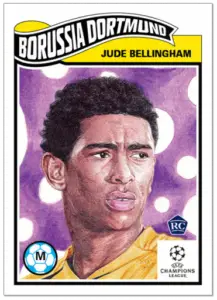If you’ve been in the sports card collecting hobby for any length of time, chances are you’ve heard of the phrase ‘rookie card’.
Rookie Cards have a bit of an aura about them in the hobby – They’re a big deal to collectors, and can be worth huge amounts of money.
However, there can be questions about them, particularly for those new to the hobby, and things that are a bit confusing, such as why sometimes they’re called rookie cards and other times referred to as a true rookie card.
So, as someone who’s been in the hobby for many years, here are 5 things you need to know about rookie sports cards.
Table of Contents
1. What Is A True Rookie Card?
This can change depending on who you ask, but generally, a player’s true rookie card is their first ever issued card, usually released during their debut season, but not always, or first year cards that are released in mainstream, and officially licenced, base sets, as part of the main checklist (ie. Not an insert).
In some instances, there might be a bit of debate, among those in the hobby, about what defines a true rookie card. Some argue that it has to be a card issued by a major brand, and others consider the very first released card for that player as a true rookie.
Sports stars these days will have multiple cards issued in their rookie season, by different card manufacturers or within different sets, so it can be hard to pinpoint which was released first, especially if it’s been 10+ years since release.
Some collectors might also refer to a player’s first card after joining a new team, or their first international card, or even their first card from a specific manufacturer, for example, as a rookie card, but by definition it has to be cards from base sets within that first season of releases.
2. Does ‘RC’ On A Card Mean Rookie Card?
Yes, when you see the letters ‘RC’ on a card, it does stand for ‘Rookie Card’.
However, it’s worth noting that just because a company prints a card with ‘RC’ on it, it doesn’t necessarily mean that it’s a true rookie card.
It could represent the player’s first card for that brand, for example their first Topps card, but they might already have a card issued previously by Panini, in a previous season. It could also represent their first card at a new team, or in a specific competition.

3. How Do You Tell If A Card Is A Rookie?
Apart from an ‘RC’ logo on a card, which we’ve already established doesn’t necessarily indicate a true rookie card, there’s not usually a way to tell a rookie card without doing some research.
There are plenty of ways to research cards and find out whether it’s a rookie.
Obviously, a quick way to tell is to see if the card was released during the player’s rookie season.
The internet has made it easy to access various databases of cards, making it a lot easier to see the various cards a player has than it was in the past, as well as the year of release, to see if it’s a rookie card.
A tool I use to manage my collection and research sports cards is Market Movers – Their huge database of cards, along with images of them, is a great way to identify cards.
There’s also other websites out there, like tcdb.com, another that I use, where you can check cards to see if they’re a true rookie card. Start with a quick search of the player’s name (if you’re not sure of that, then ask someone who knows the sport) and you can look through the list of their cards.
Another way to check if a card is a rookie is to connect with the community and ask people, through forums and groups etc. Collectors who have been in the hobby a while usually won’t have a problem identifying cards from their image.
4. Why Are Rookie Cards So Valuable?
Rookie cards tend to be valuable because they’re so popular among collectors.
There’s a mystique around rookie cards that collectors love, especially for the players who go on to be the stars of their sport. It’s something about having a card which depicts them as just a prospect, a young and unproven player who would go onto stardom.
There’s also the factor of scarcity – This one doesn’t apply as much to modern or current rookie cards as they’re more mass-produced these days, but with older cards they can be harder to come by, especially in good condition after many years. Another consideration is the fact that a young, unknown player’s card probably wouldn’t be as mass-produced as they would when that player becomes a hugely popular star, so the rookie card is rarer.
I’ve written a full separate article on why rookie cards are worth more than other sports cards.
5. Are Only Rookie Cards Valuable?
Rookie cards are not the only sports cards that hold value.
Yes, in most cases, rookie cards are worth more than any other of a player’s cards, but other cards can be very valuable as well.
It all depends on the demand from collectors, and some sports cards that are not rookie cards are very popular.
In recent times, it’s also more common for manufacturers to release highly limited and numbered sets. Cards are often numbered 1/10, for example, meaning there’s only 10 of that particular card printed. Often they can be autographed or include part of a match worn jersey from that player – an extreme example of high-end and premium sports card, that hold a lot of value regardless of the year is the Panini National Treasures brand. The scarcity mixed with the appeal of an autograph and patch (and brand prestige), for example, can make the values of these cards very high.
Final Thoughts
So, hopefully that helps answer some questions around rookie cards, particularly if you’re just starting out in the hobby. I’d always advise research before buying or selling rookie cards to make sure you know it’s true current value.


